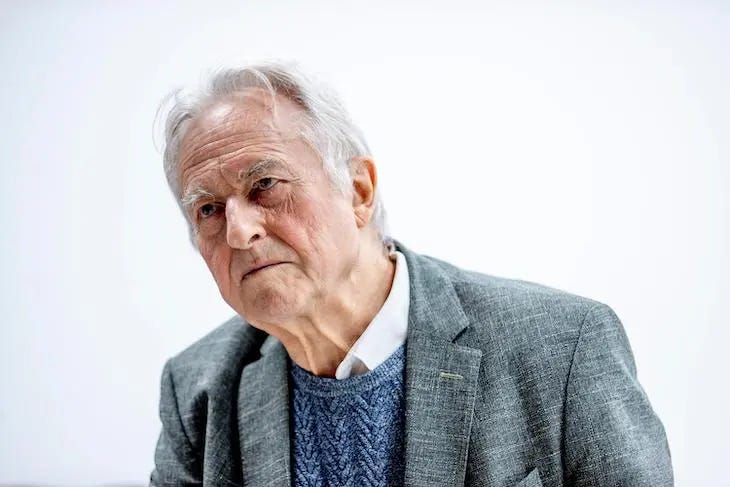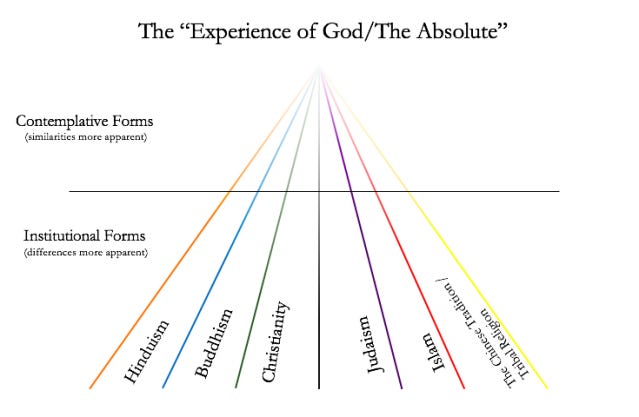In writing this, I intend to work down from the meta to the micro, and while this may seem like needless philosophising, it’s necessary to articulate why I take what some may assume are unorthodox positions on complicated and controversial issues.
Further, by exploring things this way, I hope to explain how such a philosophy can offer a path through the madness of modern liberalism, and towards stability, meaning and wisdom while maintaining a peaceable and just approach.
From the Top
Put simply, the label I feel most comfortable with is ‘traditionalist’.
For those of you unfamiliar with this term, it isn’t just another word for a ‘conservative’, but a nod to a philosophical, spiritual and political understanding of the world that doesn’t quite grasp my entire belief system but is the closest to it.
Like any traditionalist, I believe life has a divine nature. What this means in concrete terms is that there are certain ethics, ways of being and moral laws that man should aim to align with, so he can live in the most harmonious way possible.
Naturally, as such a belief would imply, this means God is the ground of all Being.
To the modern mind, this may seem like a decision of sorts. You ‘believe’ in a man on a cloud or you don’t. However, to my mind, this is a limitation that’s been placed on the divine by modernity. The simplest way to think about God in a traditionalist context is to think of such a being not as a separate (more powerful) thing in a world of ‘things’, but as life itself.
Religious and spiritual experience is simply the realisation of life as it is before limited human ideas and interpretations muddy the waters of true perception.
This leads to the first major difference between a traditionalist understanding of the world we live in and the modern one:
For modern man, reason is all, everything must bow to the power of human logic, the wonder of science. The incredible technological achievements of the 20th C only serve to buttress this point-of-view as it references itself against the supposedly deluded religious ‘Dark Ages’
For the traditionalist, reason is indeed a powerful tool of immense power that can do incredible things, yet we should be wary of reason alone as man is fallible, prideful and limited in his sense perceptions. The traditionalist has often warned that human reason alone is something to be cautiously respectful of, as while it can wield great worldly power, it cannot understand deeper forms of wisdom. This is because wisdom speaks in the language of the spirit, heart and soul. It comes through contemplation after hard experience, or more profoundly, via revelation.
Revelation is ultimately that which is encapsulated in religious tradition and passed down through the ages to the generations of a civilisation who are thereby united in shared ethical foundations and praxis. This, along with the uniqueness of a given people, forms the basis of culture, acting as the central node for its unique manifestations, its gravitational pull holding the manifold expressions in orbit and dancing in unison (no matter how distinct things may appear externally).
An oft-used model to understand traditionalism is in the ‘perennial philosophy’. a school of thought that recognises a divine, mystical reality as the heart of life that has been expressed via different understandings in different traditions throughout the world at different times.
This understanding (pictured below) purports that the contemplative forms of religious and spiritual practice are extremely similar (whether Zen Buddhism, Christian mysticism, or Islamic Sufism) because they relate to mystic experience beyond the mind and are a practice centred on the reunification with God.
It is the mystical experience - as channelled through a (semi-) divine avatars such as Jesus or The Buddha - that acts as the progenitor of a given tradition and civilisation. Once their teaching has been codified in ethical law and spiritual practice, it then becomes institutionalised and specific to a people, region and history.
This in the Western world would be Christendom, it’s why people to this day - even world-famous atheists such as Richard Dawkins - describe themselves as ‘cultural Christians’.
Dawkins, despite not being a ‘believer’ speaks in these terms because he recognises a unique moral foundation that’s rooted in (Western) Christianity that he is an indelible part of. This will become especially important later when we explore why multiculturalism and the mass immigration project are so flawed and unethical.
New Age Hippy or a Traditionalist Christian!?
You may enquire here: ‘If you acknowledge a perennial philosophy, aren’t you some generic spiritualist who follows all religions and none like a New Age hippy?’
This is a good question.
While I may understand the approach of a New Age hippy and could happily converse with them during a conversation (although I doubt they’d be open to that in reality given my political views…), the difference between the traditionalist and the New Ager would be that while I can respect and learn from other great traditions from around the world, they are not my tradition.
What does ‘my’ mean in this context? Well, while a hippy may see little to no value in external identity, seeing it as merely an illusion that blocks the true reality of the spirit, I would agree that the true reality can be blocked by worldly identity, but not believe that worldly identity is meaningless.
In essence, while worldly identity may be secondary to ultimate truth, it’s still a vital part of one’s unique existence, as it speaks to the genetic, cultural and familial ties that define an individual in his totality.
Therefore, I follow the Christian tradition. I do this because it’s part of my cultural inheritance, a way to commune with my ancestors and future descendants, but also because the Christian tradition we follow as Europeans is specific to the European people and their culture.
This is in no way contradicting the universality of God and His Love as expressed by the Christian tradition, just see below at a Catholic liturgy in Africa, would you perceive this as a traditional form of Catholic worship?

Following a tradition is, predictably, central to being a traditionalist. As a European Christian, I can look to the depth of our great tradition, which includes its proto-forms (philosophers such as Plato and Aristotle) as well as its post-forms (in the music of the Beatles or Bob Dylan - both of which carry strong Christian themes).
To make this more granular, one could follow the specific expression of his nation. In England, that would be Anglicanism. However, this tradition has been so swallowed by liberalism on one side and Protestant literalism on the other that it’s essentially unfollowable for me at this point.
For those interested, in my practice, I embrace Christian mysticism, and in an institutional sense, I am increasingly aligned with Orthodoxy.
Europe for the Europeans?
Out of interest, after reading the above, can you see how this would translate into a belief that Europe belongs to the Europeans for a traditionalist, or does it still seem confusing hippy nonsense?
For those that hit ‘No’, let me attempt to clarify this.
In the traditionalist understanding, different traditions may hark back to the ‘same’ divine core, yet their expression is specific to a unique people imbued with independent historical, genetic and cultural inheritances.
That means that the creations of Europe are unique to Europe. It’s why our architecture is unique, why our food is unique, why our art, our politics, our philosophy and our civilisation are unique. It’s a blend of the distinct European people mixed with the intellectual, artistic and spiritual traditions we have made our own over time.
Yet because of our successes as a people and the dominance of our civilisation, we have fallen into the trap of liberalism. This has caused two major problems:
It’s created a complacent, self-centred view of life that betrays its roots
It’s forgotten the spiritual unity of our tradition and tried to enforce that same unity in the form of ‘equality’ on the physical plane
The first problem is one I cover on my YouTube channel a great deal, so I won’t venture into that, yet the second is more complicated and less understood.
Leftists find it hard to believe that one can wish for Europe to retain its ethnic and cultural identity and not ‘hate’ other groups. Yet in the traditionalist understanding, groups are unique, they have different expressions and are best off tending to those expressions as the owners and re-creators of them.
Therefore, I can wish a Japanese Shinto or an Arab Muslim well, but not wish for millions of his people to take root in the West and undermine European Christian tradition and its people. This is quite controversial to a modern Western liberal, but the bog standard around the rest of the world, as it always has been before the advent of humanist liberalism.
Yet humanist liberalism, while it claims to be the ‘compassionate’ and ‘rational’ zeitgeist of our age, has caused massive damage to the West.

In destroying the connection to the deeper dimensions of life beyond the material, liberalism has removed the path to expressions of authentic meaning and true action. In the Christian tradition, this ‘true action’, is known as divine love. ‘Love’ in the modern West nowadays is seen as a soppy term due to its feminisation, or, it’s seen simply as sexual desire for another person - which most of the time is actually lust, but that’s a topic for another time.
Love in the traditional Christian sense just means a recognition of ‘shared being’, that we all have our being in God, so to speak. This is why the greatest command is to ‘love God with all your heart and to love your neighbour as yourself’.
This doesn’t mean, contrary to liberalist opinion, that you must take in every migrant from the third world, it simply means ‘don’t hate’, and recognise God’s nature in all things.
Yet as the West has removed the spiritual key from its tradition, it finds itself having to superimpose the Christian spiritual equality that underpins it via humanist and materialist means. What does that lead to? The notion of blank slate equality of all humans in a physical and biological sense, or more simply, the assumption of total egalitarianism - the core of leftist thought.
Egalitarianism vs Traditionalism
Equalitarian dogma now rules the Western world, the assumption being that the only differences between people are culturally mandated, and therefore, all we need to do is root out any and all forms of ‘oppression’ and all will be well with the world.
This theory, despite its fancy language and pseudo-intellectualism, is actually very simplistic - in fact, leftists often use needlessly flowery language and niche terminology to muddy the waters and make their theories seem more complex.
There is one core problem though. There are differences between people.
For the reasons I’ve already laid out, I have no problem saying this as in the traditionalist conception that I follow, there’s no demand at all for human beings to be the same biologically. The line in the Christian tradition is simple - we all have our being in God, who is the source of all, and this means in the spirit we can find equality, but there’s no need to pretend that equality extends to the physical dimension of differing groups.
Prior to modernity, before liberalism started to dominate the Western world, this wasn’t controversial in the slightest, and it’s still not controversial outside of the West now (although certain actors will play up to the liberal moral code if it means they can gain an upper hand politically).
With our solid spiritual roots holding us in place, we can acknowledge the differences in the world and thereby better plan for our future. A good example would be the differences between men and women - especially in noting the unique roles they have to play due to their biologies and spiritual histories. A simple way to explain this to a modern reader would be to point to the Yin and Yang symbol that embodies the core truths of masculine and feminine energies.

With regards to differing groups, once out of the liberalist paradigm, it becomes obvious that different groups have differing limitations and skills. This doesn’t equate to some innate supremacy as a leftist will so often claim, but it does mean that societies, cultures, and civilizations develop in unique ways.
The obvious inference here is that mass immigration into Europe is upsetting the ancient balance laid out by our ancestors in our culture and national identity.
The leftist delusion is that if you moved the people of Italy into Japan, and sent the Japanese to Italy, telling each to adopt the cultural practices of the other, that Italy and Japan wouldn’t change. Of course, this is madness, in a year or two both countries would exhibit the cultures of the people living there. Italy would become Japan, and vice versa,
The lesson is that culture is derivative from a specific people, and while individuals are capable of integrating into another culture - a process made much easier if the person integrating is from a similar religious, ethnic and cultural background - for this to work, the Indigenous people must remain the solid majority.
In the modern West, our governments pay no attention to this, to do so in their minds would be ‘bigoted’. So what we’re seeing is a takeover of the European way of life. This takeover is completely undemocratic, and anyone who raises concerns about it is immediately treated with suspicion by the liberal mainstream.
Yet as the powers-that-be struggle on towards their utopian vision, reality lags, and instead of calling time on their mad project, they double down! They demand more mass migration, more unconscious bias training, and more Pride marches.
They are not creating utopia, but dystopia.
Post-Left & Post-Right
While it’s obvious I lean more to the right if we’re to use the traditional political spectrum, I do believe the left-right paradigm is outdated today. The left has become so swamped in woke ideology, and the right so concerned with materialism and money, that neither ideology speaks to me, nor many born after Gen X.
As a traditionalist, I believe politics should be part of a grander conception, something that goes beyond the material world of leftism (equality on the physical plane) and rightism (materialism and money) and looks towards the great transcendent truths of life. This means God, tradition, people, nation and natural hierarchy.
The reason I am drawn to traditionalism isn’t simply because of ideology, but that it represents the eternal transcendent truths of life that offer us the best shot at a healthy and harmonious future.
Finally, realistically speaking, traditionalism is the only force that can seriously challenge liberalism.




